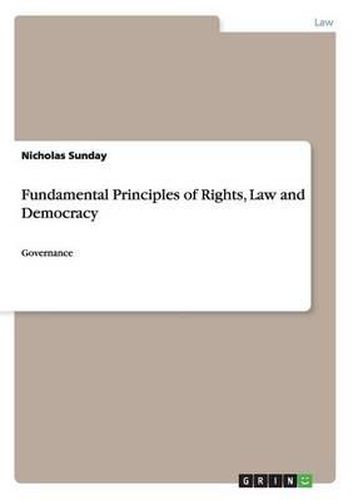Readings Newsletter
Become a Readings Member to make your shopping experience even easier.
Sign in or sign up for free!
You’re not far away from qualifying for FREE standard shipping within Australia
You’ve qualified for FREE standard shipping within Australia
The cart is loading…






Document from the year 2013 in the subject Law - Miscellaneous, grade: A, St. Lawrence University (SCHOOL OF POSTGRADUATE STUDIES), language: English, abstract: Rights and duties are correlative conceptions, that is to say, every right carries with it a corresponding obligation. They are like the two sides of a coin. Rights depend upon duties. It is only in a world of duties that rights have significance. Also, every right requires social recognition, without such recognition, rights are empty claims. Rights do not exist in a vacuum. They require the sanction of society. A right is likewise not a selfish claim. It is a disinterested desire; it is something which is capable of universal application. In asserting my right, I am really rendering a public service and when I fight for the rights of others, I may do so at great personal loss or inconvenience to myself. Older societies as a rule did not recognize rights to any great extent. They had only petitions and charities. Modern societies on the other hand give a very important place to rights. The French Revolution did not ask for charity; it demanded the rights of men. Some, if not all, of our present day constitution’s guarantee certain fundamental rights for their citizens. Rights have a tendency to grow. New rights frequently come into being, e.g. the right to work, the right to strike, and the right to retain one’s job when one is on strike etc.
$9.00 standard shipping within Australia
FREE standard shipping within Australia for orders over $100.00
Express & International shipping calculated at checkout
Document from the year 2013 in the subject Law - Miscellaneous, grade: A, St. Lawrence University (SCHOOL OF POSTGRADUATE STUDIES), language: English, abstract: Rights and duties are correlative conceptions, that is to say, every right carries with it a corresponding obligation. They are like the two sides of a coin. Rights depend upon duties. It is only in a world of duties that rights have significance. Also, every right requires social recognition, without such recognition, rights are empty claims. Rights do not exist in a vacuum. They require the sanction of society. A right is likewise not a selfish claim. It is a disinterested desire; it is something which is capable of universal application. In asserting my right, I am really rendering a public service and when I fight for the rights of others, I may do so at great personal loss or inconvenience to myself. Older societies as a rule did not recognize rights to any great extent. They had only petitions and charities. Modern societies on the other hand give a very important place to rights. The French Revolution did not ask for charity; it demanded the rights of men. Some, if not all, of our present day constitution’s guarantee certain fundamental rights for their citizens. Rights have a tendency to grow. New rights frequently come into being, e.g. the right to work, the right to strike, and the right to retain one’s job when one is on strike etc.